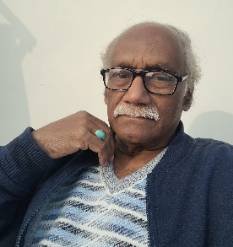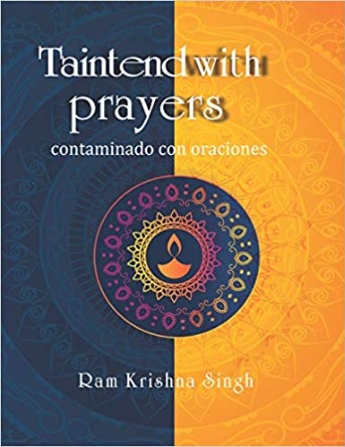
Ram Krishna Singh
- Home
- Author

-
Description
-
More Books from the Author (1)
-
Articles (1)
Also known as R. K. Singh, has been writing for over four decades now . Born (31 December 1950), brought up and educated in Varanasi, he has been professionally concerned with teaching and research in the areas of English language teaching, especially for Science and Technology, and Indian English Writing, especially poetry practices. Till the end of 2015, Professor of English (HAG) at IIT-ISM in Dhanbad, Dr Singh has published 56 books, including poetry collections Tainted With Prayers/Contaminado con oraciones (English/Spanish, 2019), Silencio: Blanca desconfianza: Silence: White distrust (Spanish/English, 2021), A Lone Sparrow (e-book, English/Arabic, 2021), Against the Waves: Selected Poems (2021), Changing Seasons: Selected Tanka and Haiku (e-book, English/Arabic, 2021), 白濁: SILENCE: A WHITE DISTRUST (English/Japanese, Kindle Edition/Paperback, 2022), SHE: Haiku Celebrating Woman That Makes Man Complete (e-book, 2022), Drifty Silence (e-book, 2023), and Poems And Micropoems His haiku and tanka have been internationally read, appreciated and translated into several languages. Find him on X (Twitter) @profrksingh
INTERPRETATIVE TRANSLATION OF TAINTED WITH PRAYERS AND OTHER RECENT BOOKS
INTERPRETATIVE TRANSLATION OF TAINTED WITH PRAYERS AND OTHER RECENT BOOKS
--R.K. SINGH
Each time I do a book, it is new, but disappointingly, it gets old without being read, reviewed, or critiqued by fellow academics, poets, reviewers, or critics that often complain about the quality of Indian English poetry and lack of criticism. Teachers and scholars involved in research hardly care to read new works published from small press by native poets and writers. They hardly suggest to the aspiring young researchers about new Indian English poets, less known Indian English authors, or regional authors writing in English that merit attention and academic exploration.
More disappointing is the academic attitude towards research in recent poetry writing and the tendency to look for recognition of a poet or writer abroad or their appreciation by foreign media to be eligible for research at home. The slavish mindset and narrowness harms their own future interest, be it creative, critical or academic.
In the IT dominated world literary culture today our Indian colleagues can’t excel with the mindset of the 1960s and 1970s, or even 1980s, finding worth in the same few familiar names that are considered substantial, but are, in fact, dated to be talked about for something new, if we really believe that Indian English poetry is readable and alive as a genre.
Fellow practitioners of poetry, ladies and gentlemen, this evening, I would like to talk to you against such a perspective about the bilingual editions of a couple of my recent books. Getting together in a Book Talk like this helps promote the cause of writing, and for now, Indian English Writing, or, if you like, Indian Writing in English. I feel honoured, and am sincerely obliged to Dr S M Yahiya Ibrahim, for taking note of my 20th poetry collection, Tainted With Prayers (2020). Thank you, Sir, and the participating poet friends and scholars for your interest in my works published since the early 1980s, but almost ignored by the print media and academia that matter. I doubt I am considered a mainstream poet yet, but I have not stopped.
I have been keen to reach out to the new, younger generation of poets, critics, reviewers, and academics, and tried to make available almost all my poems on the internet via my blogs, social sites, on-line zines and journals, and various other freely accessible resources, so that interested readers and researchers could access them easily. It has been a tremendous help, I must say. So many readers and poets discovered me, and willingly helped me, invited me to join their groups (on Facebook, LinkedIn, Twitter etc), translated my poems, and even published my newer works, most recently in Spanish, Japanese, Arabic, Romanian, and Tatar. I have kept posting about each of such publications on my Facebook wall, twitter, LinkedIn, and even Instagram. Some of you may have noticed them.
Tainted With Prayers/Contaminados con Oraciones is the result of such a social media contact I developed with Spanish poet, writer, fictioneer, translator, blogger, editor, and peace activist, Joseph Berolo Ramos, of Colombia. Now 87, he is a key voice and respected name in Latin America for promotion of poetry and unity of poets. He has raised the level of online literary activities to a new height and I hold him in high esteem for his spiritual humanism.
Joseph invited me to join his literary forum UNILETRAS, and set up a page on the sites of ‘Naciones Unidas De Las Letras’ and Ave Viajera for my recent poetry which features this collection with his translation in Spanish. In fact he introduced me to the Latin American audience as a poet from India by translating and publishing, not one, but two books, the other being the Spanish edition of my experimental haiku-tanka-haiku linked long poem, Silence: A White Distrust, which appeared last year.
By the way, the Japanese paperback edition of this collection came out three weeks ago in English and Japanese. Poet-translator Rika Inami published it. This poem is also included in the book Covid-19 And Surge of Silence in English and Tatar. Poet-translator Taner Murat edited, translated and published the collection from Anticus Press, Constanta, Romania about three months ago.
Now, a few words about translation. Because most people are unaware of what constitutes the work of a translator, how important it is, especially for a poet like me who aspires to be read by more and more people. Honestly, I don’t know the languages my works have been translated into. But it is flattering enough to say that many of my poems have been translated into over 30 languages, including Italian, Greek, Chinese, French, Arabic, Farsi, and of course, as I mentioned, Spanish, Japanese, and Crimean Tatar.
Before I talk about the translation of my Tainted With Prayers, let me read the micropoem from which the title of the collection is taken:
“waking to a morning/ tainted with prayers/ on the toilet seat/ nude nature waves a dull sun/smitten by the night’s long eclipse” This tanka also appears in my Silence: A White Distrust.
Joseph Berolo calls his Spanish rendering of my poems as ‘interpretative’, as he seeks to negotiate cultural differences outgrowing the limitations of literal translation and balancing semantic and syntactic strategies for communication. He interprets some of my words, ideas, images, and references to be intelligible to his Spanish readership in South America, and makes changes as deemed necessary. He interacted with me, as also with some of his other colleagues, and asked me to explain what I meant by a particular expression, and then, pragmatically recreated in Spanish, what he considered, logical and culturally viable.
I remember when the Syrian poet translator friend, Fatema Tayeh, was translating some of my haiku and tanka in God Too Awaits Light, she had sociocultural and religious problems with some of the words with explicit and implicit sexual meaning or connotation. She said that she would prefer to drop those poems, or rather avoid translating them. As a Syrian Arabic woman, she thought explicit sexual expression is not expected by the audience. Alternatively, she later thought she could use some other words or phrases to re-create my poems. For example, in a haiku “love tickles/ with erect pistil:/ hibiscus”, in place of “erect pistil”, she suggested to use in Arabic “distinguished pistil” or “upward pistil”. In another poem, “dreams puzzling/ smallness of waking/ I can’t live/ the child’s circumcision/promise of happiness” , in place of “circumcision”, she preferred to use “smile”.
Similarly, she had difficulty in negotiating the meanings in poems such as:
“short night and long days/ sleep loss rustles a friction/ echoing in bed/ the cycle of cravings/ over and over again” ;
“hidden between the sheets/ my smothered senses/ salted honey”;
“layers of dust thicken/on the mirror water makes/ the smuts prominent:/ I wipe and wipe and yet/ the stains stay like sin”;
“in the bath/ bare soul together--/after glow”
She suggested to use “path” or “snow” in place of “bath” to be culturally acceptable in her society. Likewise, she faced problem with my use of “nipples” in the tanka,
“when I have no home/I seek refuge in the cage/ of your heart and close/ my eyes to see with your nipples/ the tree that cared to save from sun”
and “undressing” in the haiku, “she undresses / in dim light her body/ fills room with herself”
Our interactions helped her use less suggestive Arabic expressions that are different from my English but socio-culturally acceptable to her Arabic audience. Her effort at intercultural negotiation to communicate made sense to me, even if I can’t read, write or understand Arabic. In fact, we needed to discover new ways of looking at our texts (or ourselves and our world) for solution to difficult challenges.
The publication of Fatema Tayeh’s translation is delayed because she is still working on her Arabic texts. All the same, her ‘interpretative’ translation helps me reach out to a larger Arabic audience, even if my original poem is compromised at places.
More recently, in the Japanese edition of my other collection, Silence: A White Distrust (2022), Rika Inami spent about a year to perfect her translation of my haiku and tanka into the Japanese fixed structure. She too faced several semantic, syntactic, formal and cultural challenges to negotiate the texts in accordance with the norms of Japanese haiku and tanka. She turned interpretative to be appealing, both structurally and texturally, in Japanese. She explained to me the linguistic and other changes she made in her translation before publishing the book three weeks ago. She too negotiated issues between two diverse cultures and languages in a context which demands making structural choices with textural accuracy, as she was using the fixed Japanese tanka, haiku, and senryu rhythms.
For example, There are nouns, verbs, adjectives and other words in English which, when translated into Japanese, consist of two or more moras, even if they are only one syllable.
For example, "rice ( kome 米 in Japanese)" and "think (omou 思うor kangaeru 考えるin Japanese)" are one syllable, but in Japanese "ko-me" consists of two moras, "o-mo-u" three moras and "ka-n-ga-e-ru" five moras.
This means that translating an English Tanka, Haiku or Senryu into Japanese, even if it is only one syllable, will result in multiple sounds in the Japanese kana script.
As she wrote to me, “the Japanese translation of an English Haiku or Tanka may present many difficulties in fitting it into the 17 moras of a Haiku or 31 moras of a Tanka.
In this book, I have somehow managed to solve these differences in linguistic structure and, with a few exceptions, have turned them into Japanese fixed Tanka, Haiku and Senryu.
What helped me solve the above problem was using the archaic Japanese grammar, particles, auxiliary verbs, and word conjugations.”
Lastly, when the Romanian cultural linguist friend, Taner Murat translated my English poems into a remote language, Crimean Tatar, he too encountered a lot of challenges. He made pragmatic communicative adaptation for the convenience of the Tatari audience (in Central Asia and Romania). With his style, he created a new literary diction in Tatar in terms of concept, vocabulary, usage, and imagery. His main concern was revival of a dying language by accommodating new features of culture, life and communication, arousing fresh interests, applying new norms of or for cross-cultural adaptation, or pragmatic communicative needs in a linguistic context that has been forgotten.
All of these poet translators—Rika Inami, Fatema Tayeh, Joseph Berolo, and Taner Murat—create a new literary diction, or discourse if you like, for acceptability in Japanese, Arabic, Spanish, and Tatar. They become interpretative of the English which is Indian, at times marked by a ‘deviant’ style, or rhetorical features, as you may have noticed. I don’t use punctuations, drop articles, don’t give titles, use enjambment, use fewer adjectives, and minimum possible words. I eliminate all non-essentials from my compositions, and, as poet-critic I K Sharma points out, lift the “socalled unclean words of the street and give them new dignity.” Obviously, it has its dangers. So much depends on how one reads a poem. When one normalizes the grammar of the individual lines of a poem, and translates, one finds possibilities for multiple interpretations. One faces ambiguities of all sorts. The translators, therefore, need the freedom to interpret and express what is culturally, socially, and technically viable, or convenient, in the target language.
Rika, Fatema, Joseph, and Taner read my poems more closely and discovered something readers at home missed. This may be a pointer to the lack of criticism in IEP our academic friends complain about. But we can possibly talk more about it later. Suffice it to say, there is light in everyone, waiting to be found. We just need to strive for it.
--Dr R K Singh, Formerly Professor of English & Head, Dept of Humanities & Social Sciences, Indian Institute of Technology—ISM, Dhanbad (Jharkhand).


